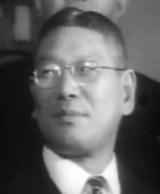
Hayato Ikeda
Encyclopedia
born in Takehara, Hiroshima
, was a Japan
ese politician and the 58th, 59th and 60th Prime Minister of Japan
from July 19, 1960 to November 9, 1964.
As Prime Minister, he advocated the "income-doubling plan" and "politics of patience and reconciliation," respectively emphasizing economic development
of Japan while minimizing societal conflict. His was noted for resolution of several major labor disputes, including a long-running strike at Miike Mine of Mitsui
Mining Company (the resolution of this strike was in fact the first act of the Ikeda cabinet.)
Takafusa Nakamura, a leading economic historian, described Ikeda as "the single most important figure in Japan's rapid growth. He should long be remembered as the man who pulled together a national consensus for economic growth." His plan predicted a 7.2 percent growth rate (thereby doubling GNP
over ten years), but by the second half of the 1960s, average growth had climbed to an astounding 11.6 percent. In addition, while Ikeda's "income-doubling plan" called for average personal incomes to double with ten years, this was actually achieved within seven years. In 1960, French president Charles De Gaulle
famously referred to Ikeda as "that transistor salesman".
Along with Eisaku Satō
, Ikeda was an understudy of Shigeru Yoshida
earlier in life, and was called an "honor student" for his commitment to the ideas presented in the Yoshida Doctrine, although he was a strong personality himself. His 1952 resignation as Minister of International Trade and Industry was the result of a blunt remark in the Diet
that "it makes no difference to me if five or ten small businessmen are forced to commit suicide," after Ikeda's policies favoring heavy industry were imposed.
Takehara, Hiroshima
is a city located in Hiroshima, Japan., the city has an estimated population of 29,093 and a density of 246 persons per km². The total area is 118.30 km².The city was founded on November 3, 1958....
, was a Japan
Japan
Japan is an island nation in East Asia. Located in the Pacific Ocean, it lies to the east of the Sea of Japan, China, North Korea, South Korea and Russia, stretching from the Sea of Okhotsk in the north to the East China Sea and Taiwan in the south...
ese politician and the 58th, 59th and 60th Prime Minister of Japan
Prime Minister of Japan
The is the head of government of Japan. He is appointed by the Emperor of Japan after being designated by the Diet from among its members, and must enjoy the confidence of the House of Representatives to remain in office...
from July 19, 1960 to November 9, 1964.
As Prime Minister, he advocated the "income-doubling plan" and "politics of patience and reconciliation," respectively emphasizing economic development
Japanese post-war economic miracle
The Japanese post-war economic miracle is the name given to the historical phenomenon of Japan's record period of economic growth following World War II, spurred mainly by Japanese economic policy, in particular through the Ministry of International Trade and Industry...
of Japan while minimizing societal conflict. His was noted for resolution of several major labor disputes, including a long-running strike at Miike Mine of Mitsui
Mitsui
is one of the largest corporate conglomerates in Japan and one of the largest publicly traded companies in the world.-History:Founded by Mitsui Takatoshi , who was the fourth son of a shopkeeper in Matsusaka, in what is now today's Mie prefecture...
Mining Company (the resolution of this strike was in fact the first act of the Ikeda cabinet.)
Takafusa Nakamura, a leading economic historian, described Ikeda as "the single most important figure in Japan's rapid growth. He should long be remembered as the man who pulled together a national consensus for economic growth." His plan predicted a 7.2 percent growth rate (thereby doubling GNP
GNP
Gross National Product is the market value of all products and services produced in one year by labor and property supplied by the residents of a country...
over ten years), but by the second half of the 1960s, average growth had climbed to an astounding 11.6 percent. In addition, while Ikeda's "income-doubling plan" called for average personal incomes to double with ten years, this was actually achieved within seven years. In 1960, French president Charles De Gaulle
Charles de Gaulle
Charles André Joseph Marie de Gaulle was a French general and statesman who led the Free French Forces during World War II. He later founded the French Fifth Republic in 1958 and served as its first President from 1959 to 1969....
famously referred to Ikeda as "that transistor salesman".
Along with Eisaku Satō
Eisaku Sato
This article is about the Prime Minister of Japan. For the governor of Fukushima Prefecture of Japan of the same name, see Eisaku Satō ....
, Ikeda was an understudy of Shigeru Yoshida
Shigeru Yoshida
, KCVO was a Japanese diplomat and politician who served as Prime Minister of Japan from 1946 to 1947 and from 1948 to 1954.-Early life:...
earlier in life, and was called an "honor student" for his commitment to the ideas presented in the Yoshida Doctrine, although he was a strong personality himself. His 1952 resignation as Minister of International Trade and Industry was the result of a blunt remark in the Diet
Diet of Japan
The is Japan's bicameral legislature. It is composed of a lower house, called the House of Representatives, and an upper house, called the House of Councillors. Both houses of the Diet are directly elected under a parallel voting system. In addition to passing laws, the Diet is formally...
that "it makes no difference to me if five or ten small businessmen are forced to commit suicide," after Ikeda's policies favoring heavy industry were imposed.

